#adrian tchaikovsky review
Text
2024 Book Review #14 – And Put Away Childish Things by Adrian Tchaikovsky
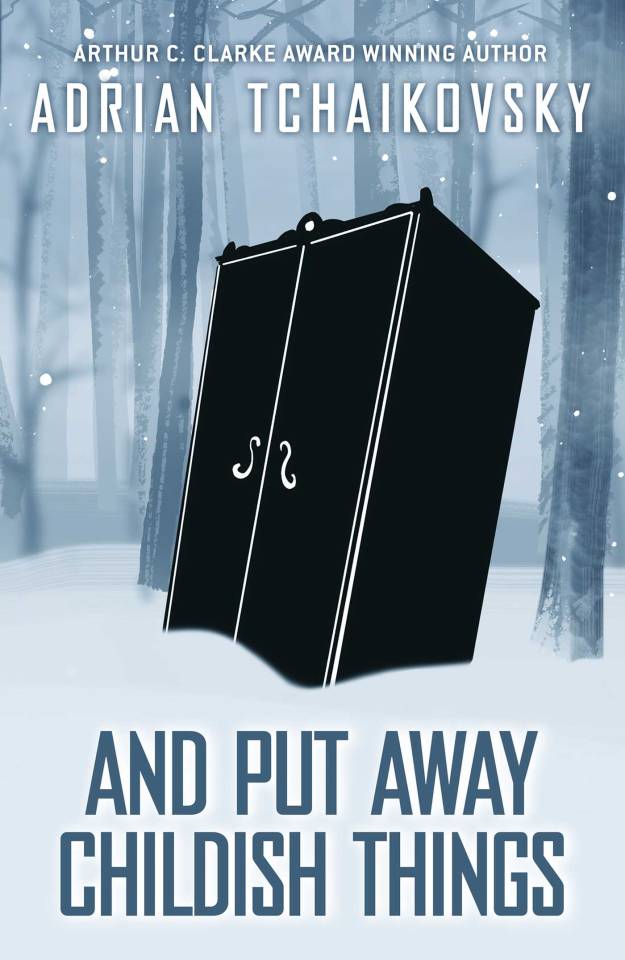
This book I basically came across by chance. Or, well, not exactly chance, but I’d never even heard of it before until I checked what Tchaikovsky books my local library system had copies of and saw it. Which in a sense is a terrible way to come into this – it’s an incredibly dramatic swerve from any of Tchaikovsky’s other stuff that I’ve read – but coming in totally blind pretty much worked, I think. Genuinely very fun read.
The story follows Harry Bodie, a children’s TV presenter facing down middle age with a career that’s never really lived up to expectations. Somewhat desperately, he signs on to a tabloid-ish program about digging into the family tree, hoping to use the residual fame of his grandmother and her fairly famous and successful series of postwar children’s fantasy novels as a career boost. Instead he gets his face rubbed in the fact that his great-grandmother is only recorded as an indigent madwoman, and the famous author was born in a sanitarium. That the famous Underhill stories were, in fact, based in large part on delusions told as childhood fables and family histories.
Somewhat unsurprisingly, the stories turn out to be less delusional than previously reported. Bodie is in quick succession accosted by a faun, approached by a suspicious PI, and kidnapped by a surprisingly moneyed fan-club-cum-occult-coven. Soon enough he’s getting his first taste of Underhill first hand – or, at least, what’s left of it after a century and change of economizing and entropy.
I’m on record as being fairly dismissive about the whole category of ‘stories about stories’, and I guess I need to eat my words a bit because I actually really enjoyed this. To an extent that’s probably just because it doesn’t get too meta – storyland is a work of deliberate artifice, the stories themselves don’t shape the world or do magic, it just generally never tries to get too cute or didactic about it – but still. This is a book where the hero at one point describes his situation as ‘Five Nights at Aslan’s’ so there’s no real principled distinction for me to cut here. One of the main characters is literally a folklorist.
Though, it’s less about stories than one specific story in particular. The unremarkable schlub plucked out of their mundane life and told that they’re special, that they’re the hero or the true heir and possess some inherent numinous essence that makes them the most important person in the world. This is a terribly appealing story, and one Harry feels the lure of very keenly – he’s self-aware enough to say quite clearly that he goes back to the frozen, decaying world full of half-dead monsters less out of morality or rationality than simply because it was a place where he mattered, for good or ill.
It’s probably not reading too deeply into the book’s themes to note that the story is a lure in a fairly literal sense, or that the true heir is destined to ‘save’ the world by being hollowed out and possessed by those who came before them.
Of course as much as this is in conversation with Narnia et al, it owes at least as much to whole genre of ‘what is nostalgic children’s property, but fucked up?’ creepypasta. Fairyland is choked with fungal growths and creepy, staticy not-snow. The scampering, troublemaking faun is miserable and worn out with bad knees. The Best Of All Dogs is a rotting, terrifying hellhound. There’s even a titanic evil scary clown. Aesthetically the book owes far more to r/nosleep than Lewis Carroll.
Harry himself is an absolute delight as a main character. By which I mean he just sucks so bad, but in very mundane and endearing ways. Who among us can not relate on some level to a failing middle-aged actor who always made a point of not trading on his family name but is secretly pretty resentful it hasn’t helped him more? He refuses the call to adventure then decides his life’s kind of shit and he’d rather get stabbed to death by goblins, so he comes crawling back and begs for a second chance. He’s left a glowing magic sword that will defeat all enemies, but it’s stuck in the body of one of his kidnappers so he just runs screaming and it spends the rest of the book in an evidence locker somewhere. I love him.
I really have no idea to what degree it was intentional, but it also does rather muse me that – okay, you know the standard bit of feminist media analysis where male characters are the actors, while female characters are generally walking set decoration and plot devices? It really deeply amuses me that Harry spends the better part of the story as a magical blood bank getting led around or terrified and awaiting rescue, whereas Seitchman (our counterfeit PI/folklorist) repeatedly forces herself into things through obsessive research skills and a complete disregard for her own safety (and at one point an enthusiastic if unpracticed willingness to sword people). Though to be clear this was mostly amusing to me because it was absolutely never highlighted or commented upon.
This is probably the first book I’ve read that’s recent enough to be set during lockdown without really being a COVID novel, if that makes sense? You could set this the year before or the year after without really losing much, and it lacks the ‘this was written in quarantine’ vibe of a lot of books I read last year. But it definitely adds a sense of specificity and timeliness to it that I rather enjoyed.
So yeah, do not open it expecting anything like Children of Time, but good book!
42 notes
·
View notes
Text
February Book Reviews: Elder Race by Adrian Tchaikovsky
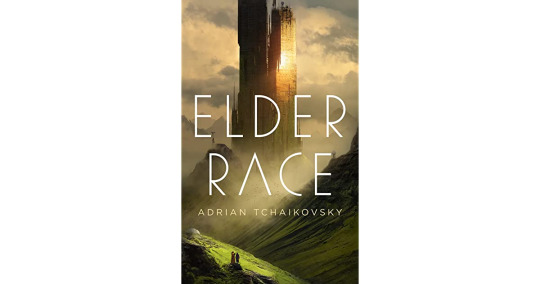
Picked this novella up because I've liked Tchaikovsky books in the past and this one had an interesting premise which reminded me of an excellent Le Guin short story. Nyr is an anthropological observer who has lost contact with his civilization and lives out most of his days in cold sleep. Meanwhile, the former colony he was sent to observe has forgotten technology and its past. When Lynesse Fourth Daughter calls on an old promise in order to gain Nyr's help in fighting a demon, Nyr will be dragged once again into human life.
The premise here is fantastic and the execution is good. I particularly liked a sequence where Nyr's explanation of the planet's past is juxtaposed with how Lynesse hears it-- because of the language and cultural shifts over time, Nyr's story will always render as the myth that Lynesse already knows. He can't even refer to himself as an anthropologist or a scientist, since Lynesse will hear the word as "wizard."
I did find the characters a little emotionally distant and difficult to connect with at times, but much less than with Tchaikovsky's other books. Overall, an excellent demonstration of Clarke's Law that sufficiently advanced science is indistinguishable from magic. Recommended.
22 notes
·
View notes
Text
If you want to read something that’s sort of like a Guy Ritchie movie and sort of like a Discworld novel about an occupied city built next to an ancient forest that contains paths to many dimensions, I strongly recommend City of Last Chances. There are a ton of Characters and they are always being put or putting themselves into Situations, there’s a lot of spooky and terrifying things interwoven with absurd comic relief, die-hard cynics and political naifs coming into conflict, and lots more. Closest book I know to it is probably Night Watch (by Pratchett, not the other ones).
15 notes
·
View notes
Text
I’m currently reading Adrian Tchaikovsky’s City of Last Chances (a great fantasy book about class conflict) and I really love the Pratchett-esque character-driven humour in it. It’s not a comedy novel and doesn’t try to be, but there’s so much of that same worldbuilding humour in it. The bickering between Yasnic and God, the invisibility of huge monsters to people who can’t really deal with them, the perfect magical high fantasy city that throws out its children. I should reread some Discworld novels
9 notes
·
View notes
Text
Hiya Everyone, I just completed reading City Of Last Chances by Adrian Tchaikovsky and I need you all to read it so I have someone to squee about Ruslav and Shantrov with. I have a fan art idea for them already. It’s a beautiful gay relationship within an amazing story.
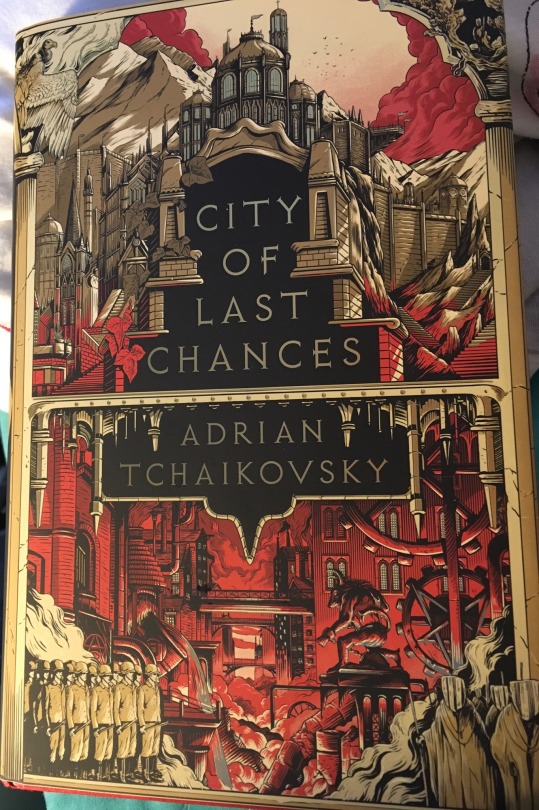
#book review#booklover#books#adrian tchaikovsky#city of last chances#Ruslav#Shantrov#lgbt representation#lgbt books#lgbtq community#lgbtqia
9 notes
·
View notes
Text
Finished Doors of Eden. It was actually pretty good. My joke last time that it was exactly His Dark Materials but without using the power of friendship to kill god was even closer than I expected: god was dying anyway and they had to use the power of friendship to pick up where he left off
As the book started explaining why all the different parallel timelines existed and how it was all put together, it was a very cool bit of insane worldbuilding. None of it really made sense if you think of how the many worlds hypothesis typically plays out in fiction, but then the book acknowledges and explains that as the third act twist. And then the writing as the timelines splintered was very cool. Hard to explain, but vaguely like the Knives Out approach of refilming scenes with the additional information included (since that's fresh on my mind)
It was also extremely funny that the minor hetero love triangle drama was resolved by the second woman proposing that maybe they could just try polyamory
7 notes
·
View notes
Text
Eyes of the Void

Eyes of the Void by Adrian Tchaikovsky
My rating: 5 of 5 stars
Eyes of the Void, the follow up to The Shards of Earth, avoids the difficult second 'album' curse by playing to the authors strengths, good characters, dire straits and imaginative set pieces with smart meta commentary.
The return of the unfathomable Architects places the universe in considerably dire straits, as factions of humanity inch closer to war and alien species act for their own unknowable motivations.
As worlds fall to the architects' 'art' The crew of the Vulture God find themselves at the centre of things again as Idris Telemmier's unique abilities to communicate with the Architects make him a prime target for any faction's plans to combat the universal threat.
The first part of Eyes focuses on Idris, his motivations and worldview. Now working for the Parthenon, Idris and the crew of the Vulture God are a bundle of mixed and conflicted loyalties, where cultural clashes blend into understandings of others. Idris as a character works well as a something of a philosophical guide, his angsty self-doubt expressing moral and ethical quandaries thrown up by the world/universe building. It's a trait shared by the Vulture God crew, there always seems to be a little more philosophical depth to Tchaikovsky's characterization that makes them seem particularly human.....even some of the more bizarre aliens....
There is a bit less punchy action than the first book, the plot takes a noir-ish spycraft turn as a mysterious packet of data sets rival intelligence agents on a treasure hunt that drags in the Vulture God crew, which in turn drags in old enemies. The action picks up with a great space opera set piece. As a world is slowly destroyed, Idris and the Vulture God crew strive to escape competing kidnapping attempts, whilst being on the verge of resolving some of the universe mysterious, as well as a planet’s cataclysmic demise. It's a good narrative juggling act, capped off by an epic entrance, a plot twist and some noble sacrifice that sets up a more frantic second act that continues with the treasure hunt theme, the treasure this time being altogether more personal.
As factions and enemies circle the vulture God crew a few surprising members join in, that continues the conflicted loyalties narrative. Some mysteries are resolved revealing some plot shifting motivations and underneath is a vein of meta political/philosophical commentary, how the powerful can turn down a dark path where once an idea is committed to it is hard to acknowledge as a bad mistake. Even the undeniably villainous characters have subtle depths that lift them above cardboard stereotypes.
The action heats up in the final act on an imaginatively hellish planet full of deadly nuclear flowers. As competing factions converge there are exciting payoffs to storylines and just enough revelations and plot twist to keep the narratives hot going into book three.
Eyes is typical Tchaikovsky, mixing existential quandaries, modern allusions and good characters with imaginative space opera action. A good second book that delivers on the promise of the first.
View all my reviews
#adrian tchaikovsky#books and libraries#book#book recommendations#book review#bookish#bookaholic#scifi#space opera#reading#books
3 notes
·
View notes
Text
TBR/TBL pile review: Alien Clay, by Adrian Tchaikovsky
Tor8 March 20249781035013746400 pages Audiobook narrated by Ben Allen
Synopsis
They travelled into the unknown and left themselves behind . . .On the distant world of Kiln lie the ruins of an alien civilization. It’s the greatest discovery in humanity’s spacefaring history – yet who were its builders and where did they go?Professor Arton Daghdev had always wanted to study alien life up close.…
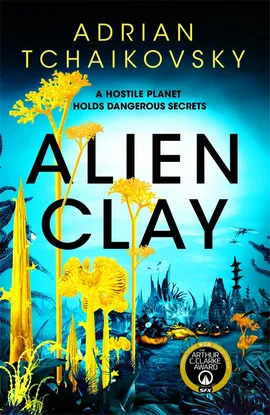
View On WordPress
0 notes
Text
'Dogs Of War' Asks Tough Questions
'Dogs of War' questions humanity under the guise of roaring action and war.
#scifi #books #bookreview
Dogs of War (2017) by Adrian Tchaikovsky covers a lot of ground but it’s primarily a book about identity. What makes us human? Can we recognize those traits in something other than human? And, having recognized those traits in others, are we able to accept them? Tchaikovsky isn’t covering new ground, be he does it in a thoroughly entertaining way making Dogs of War an uncommon book. One that…

View On WordPress
0 notes
Text
Book Review 16 - Empire In Black and Gold by Adrian Tchaikovsky
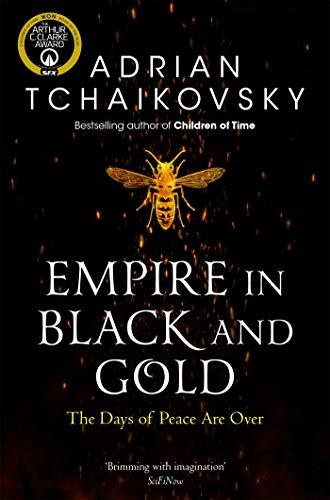
Okay, now onto the May reviews! Backlog vanishing before my eyes (or at least is now only 6 books long).
So I went into this book almost entirely blind – my roommate had gotten it as a secret santa gift from someone without much understanding of their taste in fiction, and it had just been laying unopened on the book shelf for four months until I grabbed it entirely based on the author.
I have actually read a decent amount of Tchaikovsky before – Children of Time and Ruin, and then Elder Race – but Empire was honestly entirely different than any of them (beyond a clear aesthetic fascination with anthropods, anyways). Which really only makes sense, considering it’s the first volume of a ten-book map fantasy series instead of hard sci fi or a fairly literary genre-blending novella, and also that it was published the better part of a decade before any of them. But these are things I did not know!
Anyway, there was some fast expectation adjustment going on as I read; the book is map fantasy, of the ‘could basically be someone’s D&D campaign except for how often they split the party’ variety. The central conceits (or gimmicks, depending on how uncharitable you’re feeling) are first of all that instead of having a world populated by humans, elves, dwarves, orcs, and so forth, everyone in the setting is one type of another of insect/arachnid-kinden, humans offshoots whose ancestors infused themselves with the essences of some of the gigantic anthropods who are what the world has instead of chimera and dragons. They physically vary about as much as people in fantasy worlds usually do, and also they each have their own kind of magic. Importantly, the ability to understand, use and maintain complex machinery – to be ‘apt’ – is one of those inherited types of magic, and the Lowlands (the books setting) went through some real upheavel a couple centuries back when the Apt ants and beetles got good enough at technology to overthrow their wasp and mantis overlords.
The story itself is about the looming threat of conquest by the expandsionist Wasp Empire on the border of the Lowlands, and the refusal of the city states’ robber barons and magnates to see it as a threat instead of a profitable trading partner. The protagonists are barely-grown students who are wards or clients of an aging self-appointed spymaster whose been trying to rouse the alarm who are thrown into the spy games after a botched assassination attempt and from there there are duels, slavers, airships, prison breaks, heroic resistance fighters, love triangles, fraught long-lost parental relationships, etc, etc.
That probably sounds pretty dismissive, but I do want to emphasize that it’s not at all bad – it’s just all much more conventional than I’m used to from Tchaikovsky, which is was a bit disappointing. Tropey as it all was, it was still fun, and well-executed and -written enough to be the most enjoyable book I’d read in a decent bit.
Anyway, if a book must have fantasy race science with civilizations of entirely-human-but-also-meaningfully-biologically-distinct demographics, I thought this was pretty well done? Mainly in that it always seemed pretty clear that the ostensible immutable differences in character and intelligence between them are just our main POV being sheltered and unthinkingly racist, and it just barely manages to avoid having one of the kinden be ‘the evil one’, or be a bunch of stupid savages (barely).
I also did appreciate that Tchaikovsky managed to avoid making the Lowlands seem like any sort of utopia (or even, like, a good place – slavery and amoral robber barons and violent chauvinism everywhere), without it ever really being in question whether the whole place getting conquered by the vaguely Roman slaver empire would be any sort of good thing. Likewise also kind of amusing how the main villain’s whole subplot involves having his nose repeatedly rubbed in the fact that, even if he is personally incorruptible and devoted only to the good of the empire, absolutely none of his superiors, peers or subordinates are.)
Anyway, overall a fun read, most of the main cast was pretty endearing, fun pulpy adventure plot with not-entirely-awful pacing, love triangle plot that didn’t entirely make me was to light the book on fire. Still, can’t say it got anywhere close to inspiring me to read the other 9 volumes of the series.
26 notes
·
View notes
Text
June Book Reviews: Children of Time by Adrian Tchaikovsky
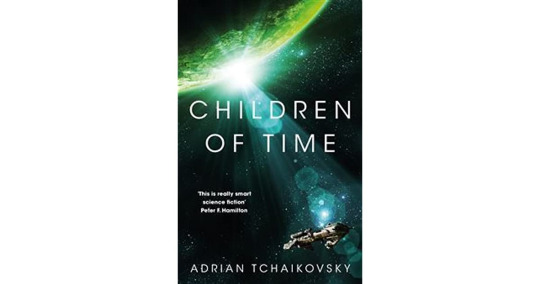
This book had been on my radar for a bit after a recommendation by @st-just. It’s hard sci-fi with, rather refreshingly, nearly zero investment in humans or character arcs entirely. The detail is all on the excellent worldbuilding, which is handled with a light touch that never slides into jargon or unnecessary info-dumping. Instead of the usual tiresome characters and plot, there are SPIDERS. Really great spiders. No, seriously. I think the ultimate effect of this book is to make you think that humans are mediocre and petty while spiders are awesome. It reminded me most of something in between Cherryh’s Foreigner and Sue Burke’s Semiosis, leaning more heavily towards the Burke.
The book is told in alternating sections. One half is about a long-haul generation ship where a man is hauled out of the freezer (cryogenic storage) every century or so to an increasingly deteriorating situation. The other half is about genetically modified space spiders over the generations, watching their culture develop and become more complex over the centuries. Which is an interesting juxtaposition with the declining situation for the human race. But the spiders have ANT COMPUTERS and convoluted gender politics and WEB CITIES and biomechanical spider public transport.
I was mildly skeptical about the reverse-sexism gender politics. It’s one of those things that can be appallingly bad when handled poorly. But while Tchaikovsky certainly didn’t have anything original or groundbreaking to say about gender, the context of female spiders biting off the heads of males without legal repercussions was sufficiently different from any of our gender politics to avoid the obvious heavy-handed allegories.
Verdict: Recommended, although possibly not for the faint of heart or the arachnophobes. Spiders are awesome. I already have the next book on hold, although it has an intimidatingly long waitlist.
48 notes
·
View notes
Text
#reviewer: throne of salt#author: adrian tchaikovsky#title: children of ruin#author: james branch cabell#title: something about eve#author: naoki urasawa#title: monster#author: junji ito#title: uzumaki#author: ogi ogas#author: sai gaddam#title: a billion wicked thoughts#author: david lindsay#title: voyage to arcturus#author: john uri lloyd#title: etidorhpa
0 notes
Text
Small Gods by Terry Pratchett
This last week I've reread one of my favorite books by Pratchett: Small Gods. Although absolutely being a story worth talking about, the reason I decided to go back to it was mainly its core worldbuilding concept: the small gods. Pratchett envisions gods as beings that look for human belief in them, and that grow and decline as the belief in them does. The deserts are littered with countless gods that never had any believers, and the few who lost it.
I don't know whether Pratchett was the first with this idea but when reading this as a teenager, it made me look at religion in a different way. As a third-generation atheist, I always saw religion as this abstract social-construct thing that I didn't really understand nor cared for. To me the socially-constructed part remains, but my perspective changed from 'a meaningless thing people arbitrarily attach meaning to' to 'a meaningful thing because people attach meaning to it'. Writing this now that conclusion seems obvious, but it was a radical shift for my 15-year-old self.
Anyway, when reading Adrian Tchaikovsky's City of Last Chances I really enjoyed seeing this concept being used (mainly in Yasnic's chapters), not as central a theme as in Small Gods but still a meaningful part of the story, and I'm glad it made me think of this little gem again.
#reviews#Terry Pratchett#small gods#Discworld#religion#Adrian Tchaikovsky#City of Last Chances#books
8 notes
·
View notes
Text
Lords of Uncreation by Adrian Tchaikovsky — Book Review | A Perfect Closing Act
You can find the review for book 1 here, and for book 2 here.
Published by: TORSeries: The Final Architecture (#3 of 3)Genre: Sci-fi, Space OperaPage Count: 608Format: Paperback
It really is quite infuriating how good Tchaikovsky is at this whole writing thing. Lords of Uncreation marks a final exclamation mark to what has become a favourite trilogy of mine in the space opera genre. There is…
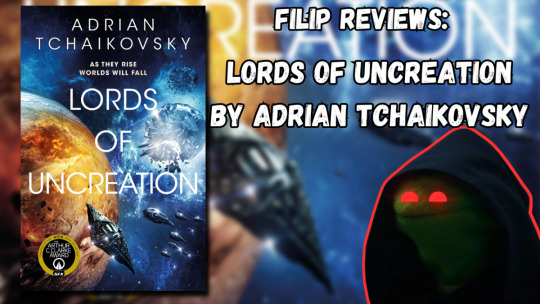
View On WordPress
#Adrian Tchaikovsky#book review#critic#fiction#literature#Lords of Uncreation#Sci-Fi#Science Fiction#Space Opera#The Final Architecture#writer#Writing
0 notes
Text
Children of Time
This weekend I read Children of Time by Adrian Tchaikovsky. I've heard a lot about it recently, and I've previously read his stand-alone half-fantasy, half-sf novel Doors of Eden (which I loved). Overall I thought this one was pretty interesting, although not as fun as Doors of Eden. I'm not normally a fan of stories with this sort of generational time skip between sections, mostly because I just find them depressing, but this managed to mostly avoid that by having each section end with some sort of progress towards the future
There are two main plot threads in this book. The first takes place on "Kern's World," a terraforming project created by humanity at its peak. Imagine Planet of the Apes, but all the apes burnt up on reentry and sentient arthropods developed into the dominant species. Meanwhile, a sleeper ship from post-apocalyptic Earth arrives a few millennia later, hoping there would be an Earth-like planet ready for them to settle. The story is told in chunks over the next several centuries, as generations of sentient jumping spiders discover radio, make contact with the terraforming AI, and build a space program to fight off the human invaders. Meanwhile the key characters on the sleeper ship are in and out of cryosleep, playing out all the standard tropes of mechanical and societal decay on sleeper, and later generational, ships
All of the chapters set on the spider world were absolutely fascinating. It's similar to the vignettes in Doors of Eden, but now Tchaikovsky was able to spend 300 pages drilling deep into a single case study of the evolution of a completely alien form of intelligent life. The chapters set on the sleeper ship were not as great. I've read a ton of sleeper/generational ship stories, and like I said, I mostly find them depressing at this point. Other than one stint into the requisite "descent into barbarism and worship of Technology," though, Tchaikovsky manages to keep it mostly optimistic. I think that's because it's a combination of both sleeper and generational ship tropes, and they keep each other from going too far into a feedback loop
I know there are two more books published in this series, following the civilization that ends up winning Kern's World (no spoilers). Children of Time didn't bring me as much joy to read as Doors of Eden, but it was still a very cool piece of speculative fiction. I look forward to the next books, but I just hope they don't also follow the time skip narrative structure
2 notes
·
View notes
Text
Harry (Felix) Bodie starts out as a children’s presenter desperate for further career opportunities and fame. After appearing on a reality tv show (kind of like who do you think you are) he discovers that what he believes about his family isn’t true at all.
After a series of events he finds himself in the magical Narnia-ish world his grandmother had written about. Except this world isn’t a fairytale for children anymore and he, the heir, must find a way to save it.
‘And put away childish things’ was a fun, short read. I enjoyed the nods to other portal to another world books and the familiar elements that reminded me of children’s books I enjoyed as a kid. The book was a little slow to start and is set during the 2020 uk lockdowns, in a way this made sense as nobody missed Harry when he went missing. Harry was entirely unlikable with only a few redeeming moments, very much a reluctant hero until the very end when he holds on to his ‘saviour destiny’ like a spoiled child who has been told he cannot be the hero after all. Despite this I loved the way the creatures from Underhill were portrayed and I really wish I could go into more detail but I worry it would give spoilers.
I received an arc of this book from NetGalley. All opinions are my own.

#book tumblr#books#ebookreaders#bookstagram#arc review#netgalley#netgalley review#adrian tchaikovsky#andputawaychildishthings#bookreader#bookworm#fantasy books#fantasy
1 note
·
View note